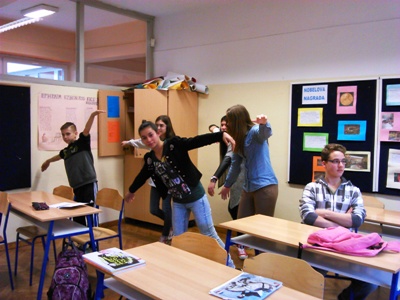Very important task for us is to find out how much our students know about children rights and Convention on the rights of child. For that purpose let's make an interview at our schools and ask students do they know what is Convention on the rights of child, do they know some of the rights of child, if so, let's name them. At the end we will choose 10 rights mostly mentioned in each country. Everyone can use it's own form for presentation. Hope you will enjoy in this task!
Croatian Team
Croatian team surveyed the first grade students how much do they know about Convention on the Rights of the child at the beginning of our project Learn Civic & Act.
https://www.youtube.com/watch?v=i93B4GuSLq4
We also had a lesson about Convention on the Rights of Child held by teacher Helena Novosel.
https://www.youtube.com/watch?v=rUcYT0Rn3Zc
Very useful material is Thinking rights by UNICEF which you can find in MATERIALS > FILES >CROATIAN TEAM
------------------------
Dear partners,
We are interviewing at our school about children’s rights and afterwards we are going to share with you in TwinSpace or through a video that we are going to create with our ITC’s teacher.
We hope you enjoy our first video: everything was done for us!
Portuguese Team
-------------------------------
Children's rights: the right to try out things - German Team
It is not a right written down in the Convention, but we think children should have the right to try out things and make their own experience. This is shown in the slideshow we prepared some time ago:
------------------------
And if we go to school on pyjamas? - Portuguese Team
We accepted the proposal of the german team "children's should have the right to try out things" and we thought "And if we go to school on pyjamas?"
That's what we did...
-------------------------------
News from the German Team
We played a game which led to very interesting discussions. The question was: What rights do children have? Three different "rights" were read to the pupils, two of which were wrong but sometimes very desirable, only one of the suggestions was right. All three suggestions had numbers (the first one that was read was number 1, and so on) and the numbers 1,2,3 had been placed on the floor before starting the activity. The pupils had to go to the number of the right which they thought children really have.
You find a translation of the activity under Materials/Files/German Group and we encourage you to also do it. After that please try to solve our quiz! Photos show children that are denied essential rights and we would like your pupils to guess what right it is.
What right is the child denied?

Find four more pictures in the German Folder "Pictures"! *
* Go to the new folder: "German team GAME: What right is the child denied"
OŠ dr. Vinka Žganca, Zagreb



Workshop description - Richard Bach, Jonathan Livingston Seagull
Students are divided into groups, each group receives a different part of the text, but in sequence. Preparing a dramatic display of his text; copies of their presentations in the order in the text below. It is the beginning of the text, Jonathan Livingston Seagull, in which he exercises breakneck flying and it is completely different from other gulls. At one point, a flock condemns him and ejected from the community. The rest of the text, and after the workshop, students must read themselves as lektirni task.
Each group in the class (and we have been working on two eighth grade) in their own way dramatic displays the contents of your part of the text. After that, all in one role (seagull Jonathan, another gull, elders flocks, mother, father, old gull) take place on an imaginary diagonal line at its ends two opposing arguments: Jonathan should remain in the flock / Jonathan should be expelled from the flock .
Each of the students fit the appropriate place between the allegations made in accordance with its opinion, or attitude. Each member pleads and argues his position.
During the workshop, in addition to achieving the objectives related to reading and understanding lektirnog works, develops critical thinking and an awareness of needs and the right to freedom of expression of thoughts, ideas, feelings, freedom to choose.
The next class students found members of the Convention on the Rights of the Child and the Universal Declaration of Human Rights which recognize violated or they are entitled.